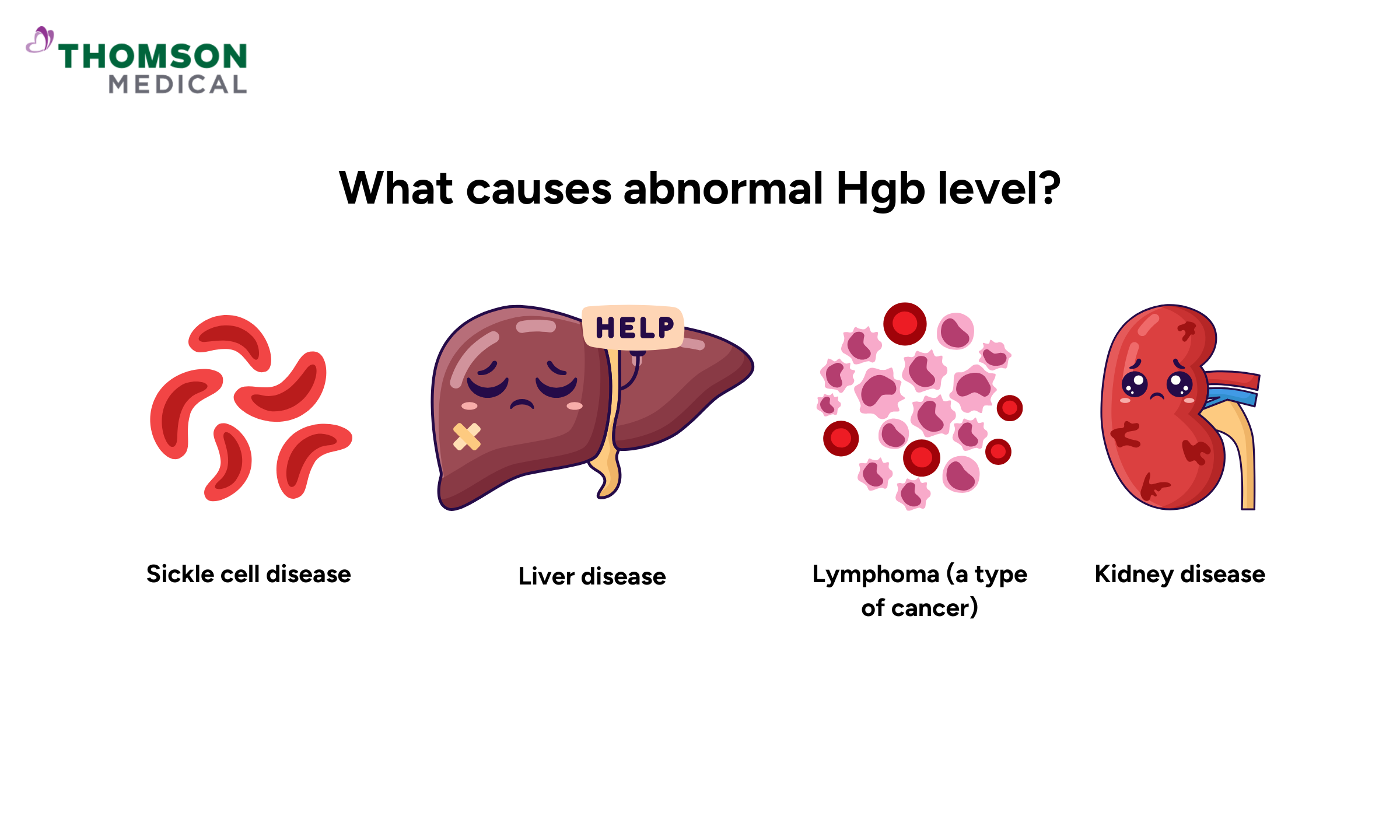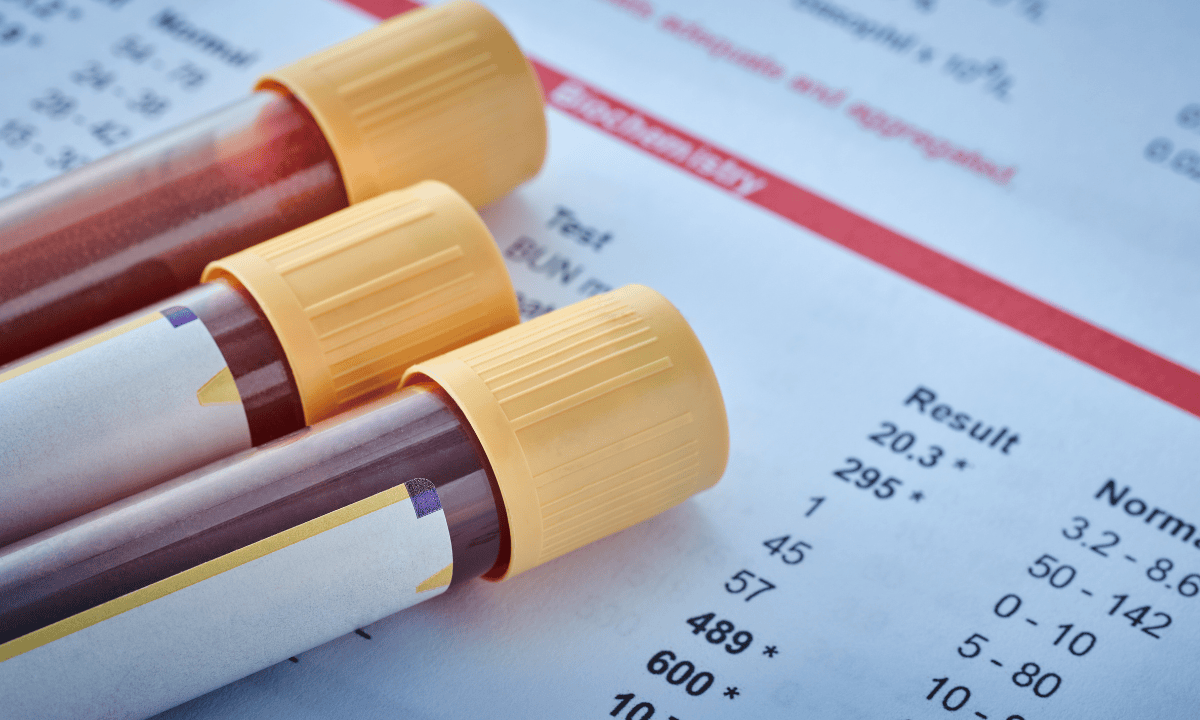What is an MCHC blood test?
Mean corpuscular haemoglobin concentration (MCHC) is a blood test to measure the density of haemoglobin (Hgb) in your red blood cells. Haemoglobin is a protein that allows your red blood cells to carry oxygen around the body.
If these proteins are higher or lower than the normal range, it may be an indication of anaemia or other blood disorders. To help diagnose your medical condition, an MCHC blood test is usually performed alongside more comprehensive tests like a complete blood count (CBC).
When would I need an MCHC blood test?
An MCHC blood test can be done as part of your routine blood check-up or to monitor existing health conditions. However, your healthcare provider may also perform this test if you show symptoms of abnormal Hgb levels or an iron deficiency.
Here are some symptoms that may prompt your healthcare provider to perform an MCHC blood test:
Fatigue and weakness
Pale skin or jaundice (yellowing of the skin and eyes)
Shortness of breath
Dizziness
Cold hands and feet
If you are experiencing any of these symptoms, request an appointment with Thomson Medical. Our specialists can assist with further diagnosis, including an MCHC blood test to identify the underlying causes of your medical conditions.
What to expect during an MCHC blood test
Before the procedure, no special preparation is required, as it is just a simple blood draw. However, if the MCHC is done alongside a blood test to measure blood glucose or cholesterol, you may be asked to fast.
During the procedure, your healthcare provider will draw a small amount of blood from a vein in your arm and collect it in a vial. Once the sample is taken, the needle will be removed, and a gauze and a bandage will be placed on the puncture site. The entire procedure usually takes less than five minutes.
What do the results of an MCHC blood test mean?
Once the blood sample is collected, the Hgb density in your blood will be examined. The MCHC blood test results are shown in grams per decilitre (g/dL), with a normal range falling between 32 and 36 g/dL, or 320 and 360 grams per litre (g/L). If the test results show a value that is too high or low, it may indicate underlying blood conditions.

Low MCHC level
Low MCHC measurement, or hypochromia, indicates that you have a lower concentration of haemoglobin in your red blood cells. Having less haemoglobin reduces your blood's capacity to carry oxygen to your organs. Here are some common causes of a low MCHC, such as:
Iron deficiency
This is the most common cause of low MCHC levels, as insufficient iron in the body can negatively impact the red blood cell production and the levels of haemoglobin.
Vitamin B6 deficiencies
A vitamin B6 deficiency can lead to lower Hgb levels because this vitamin plays an important role in the haemoglobin synthesis.
Kidney disease
Kidney disease can cause low MCHC levels, as the kidneys cannot make enough erythropoietin, a hormone that plays an important role in red blood cell production.
Haemoglobinopathy
Haemoglobinopathies are a group of genetic blood disorders that affect Hgb production. One example is thalassaemia, which interferes with the normal production of haemoglobin and formation of red blood cells.
Lead poisoning
Lead poisoning occurs when lead accumulates in the body over months or years. This heavy metal can negatively affect enzymes involved in the synthesis of haemoglobin, leading to decreased levels of this protein.
High MCHC level
A high MCHC, or hyperchromia, means that your red blood cells have a higher concentration of haemoglobin. Usually it's not a cause for worry, but if it's too high from the normal range, it may suggest an underlying medical condition that affects blood properties. Here are some health conditions that can cause high MCHC, including:
Liver disease
The liver is responsible for breaking down red blood cells, but medical conditions such as cirrhosis can accelerate this process. As a result, red blood cell counts may decrease even as haemoglobin levels remain stable, causing the Hgb levels to appear higher.
Inherited blood disorder
An inherited blood disorder, such as sickle cell disease or hereditary spherocytosis, causes the red blood cell shape to be abnormal, resulting in a decreased red blood cell volume.
The changed cell volume can cause the MCHC level to increase because it affects the overall concentration of haemoglobin.
Haemolytic anemia
Haemolytic anaemia is a medical condition that can increase MCHC levels due to the rapid destruction of red blood cells that exceeds the rate of production. As a result, the remaining red blood cells typically have a higher Hgb content compared to the reference range.
Autoimmune disorders
Autoimmune disorders occur when the immune system mistakenly attacks the body's own cells, including red blood cells. Examples of such conditions include lupus and lymphoma.
These disorders can lead to elevated MCHC levels, as the concentration of haemoglobin in the remaining red blood cells increases.
Vitamin B12 deficiency
Vitamin B12 is essential for the production of healthy red blood cells. A lack of this vitamin can lead to the formation of defective blood cells, negatively affecting their ability to efficiently transport oxygen throughout the body.
An MCHC test is a part of a complete blood count (CBC), which offers insights into the health of your red blood cells. Your healthcare provider may recommend additional blood tests to diagnose your condition accurately if your MCHC results show abnormalities.
Here are some other blood tests that may be performed, such as:
Mean corpuscular volume (MCV), which measures the average size of your red blood cells.
Mean corpuscular haemoglobin concentration (MCH), which measures the average amount of haemoglobin in a single red blood cell.
Red blood cell distribution width (RDW), which measures the size variation of your red blood cells.
The information regarding your red blood cells allows the healthcare providers to diagnose various health conditions or monitor existing health issues, including chronic diseases and nutritional deficiencies.

Accuracy of test results
The MCHC blood test doesn't directly measure the density of Hgb in red blood cells. Instead, it provides a calculated estimate based on measurable factors, such as haemoglobin levels and red blood cell count in a blood sample. It can also be calculated using the size of red blood cells and the average haemoglobin mass.
As a result, the MCHC blood test may not consistently provide reliable results. The inaccuracies can stem from errors in measuring haemoglobin, counting red blood cells, or determining blood cell size. Additionally, any temporary changes in your blood can also influence the MCHC results.
Here are some factors that can affect the accuracy of an MCHC blood test, including:
Blood transfusion
Blood transfusions can temporarily raise your MCHC levels because the transfused blood introduces a significant amount of haemoglobin in the red blood cells.
Plasma transfusion
Plasma is the fluid component of blood, where red and white blood cells float. If you have recently received a plasma transfusion, your plasma levels are temporarily increased, resulting in lower haemoglobin levels.
Combined anemia
A combination of anaemia that lowers MCHC (such as iron deficiency anaemia) along with another type that usually increases MCHC (like sickle cell anaemia) can make the MCHC results inaccurate.
Infections
Some infections, like cytomegalovirus and pneumonia, can trigger blood clots, which might make your Hgb levels seem higher than they actually are.
Mishandling of blood samples
Although unlikely, there’s a chance that your blood sample might have been mishandled. Especially if the sample needed to be transported to the laboratory for analysis.
During transport, the blood sample can get exposed to external factors, such as temperature fluctuations, which may affect the results later on.
MCHC is an indicator of your blood health and can help diagnose anaemia and other blood disorders. If you want to learn more about MCHC blood tests and whether they are appropriate for your specific medical condition, request an appointment with Thomson Medical.
Our specialists can help by providing additional information and making a personal recommendation about whether this blood test is suitable for you.
Are there any risks to this test?
Similar to other blood tests, an MCHC blood test is a low-risk procedure that only requires a small blood sample. However, since it involves drawing blood directly from your vein, you might experience some minor discomforts, including:
Slight bruising, swelling, or soreness at the puncture site.
Slight pain or discomfort around the area where the needle was inserted.
There may be a slight sting during the needle insertion or removal process.
Dizziness due to the withdrawal of blood.
FAQ
What does it mean if your MCHC is low?
A low MCHC test result (below 32 g/dL) indicates that your red blood cells have a lower haemoglobin concentration compared to the normal range. These levels can hinder your blood's ability to transport oxygen to your organs, leading to symptoms such as dizziness, fatigue, and pale skin.
Can stress cause high MCHC?
While stress does not directly increase MCHC levels, it may have an indirect effect during a time of high stress. It may worsen existing medical conditions, such as autoimmune disorders, which increase MCHC levels. However, further research is needed to properly understand the link between stress and MCHC.
What does it mean when your MCHC is high?
If your MCHC is above 36 g/dL, that means your red blood cells have a high haemoglobin concentration. While such an elevation is not always a cause for concern, it could signal a medical condition that affects your blood properties, such as liver cirrhosis, haemolytic anaemia, or vitamin B12 insufficiency.
What is the difference between MCH and MCHC?
Two components of a complete blood count (CBC) that assess red blood cell health are mean corpuscular haemoglobin (MCH) and mean corpuscular haemoglobin concentration (MCHC).
MCH measures the average amount of haemoglobin in a single red blood cell, giving an idea of how much haemoglobin each cell contains. On the other hand, MCHC measures the concentration of haemoglobin relative to cell size, showing how dense the haemoglobin is within each red blood cell.
How to improve low MCHC in blood?
You can improve your MCHC results by making sure that you consume an adequate amount of iron, vitamin B6, and vitamin B12 on a daily basis. Here are some changes in your diet that you could try to help improve your levels:
Consume iron-rich foods such as spinach, chickpeas, red meat, and sardines.
Incorporate more vitamin B6 by adding eggs, beef, carrots, sweet potatoes, and bananas to your meals.
Increase your vitamin B12 consumption with foods such as yoghurt, milk, tempeh, and tofu.
Regularly consume iron supplements.
Reduce consumption of beverages that interfere with iron absorption, such as tea.
The information provided is intended for general guidance only and should not be considered medical advice. For personalised recommendations based on your medical conditions, request an appointment with Thomson Medical.
For more information, contact us:
Thomson Specialists Paragon (Health Screening)
- Mon - Fri: 8.30am - 5.30pm
- Sat: 8.30am - 12.30pm
Call: 6735 0300
Request a Health Screening